UK Entrepreneurship & Small Business Management: Analysis Report
VerifiedAdded on 2024/06/05
|19
|5938
|482
Report
AI Summary
This report provides a comprehensive analysis of entrepreneurship and small business management, focusing on the UK economy. It identifies various types of entrepreneurial ventures, including small business, start-up, large, and social entrepreneurship, highlighting their similarities and differences in financial goals, risk and reward, value creation, and marketing communication. The report further discusses the diverse range of entrepreneurial ventures in both the public and corporate sectors, examining their scope, development, and growth in the UK. It critically evaluates the contribution of micro and small businesses to the UK economy over the last three years, supported by recent data, and examines their role at local, regional, national, and international levels. The importance of small businesses and start-ups to the UK economy's growth is also discussed. Additionally, the report analyzes the characteristics and skills of successful entrepreneurs, differentiating them from other business managers, and assesses how entrepreneurial personality reflects motivation and mindset. It explores arguments related to entrepreneurial traits, such as whether entrepreneurs are born or made, and examines how background and experience can either hinder or foster entrepreneurship, using examples and independent research to compare and contrast successful entrepreneurs.
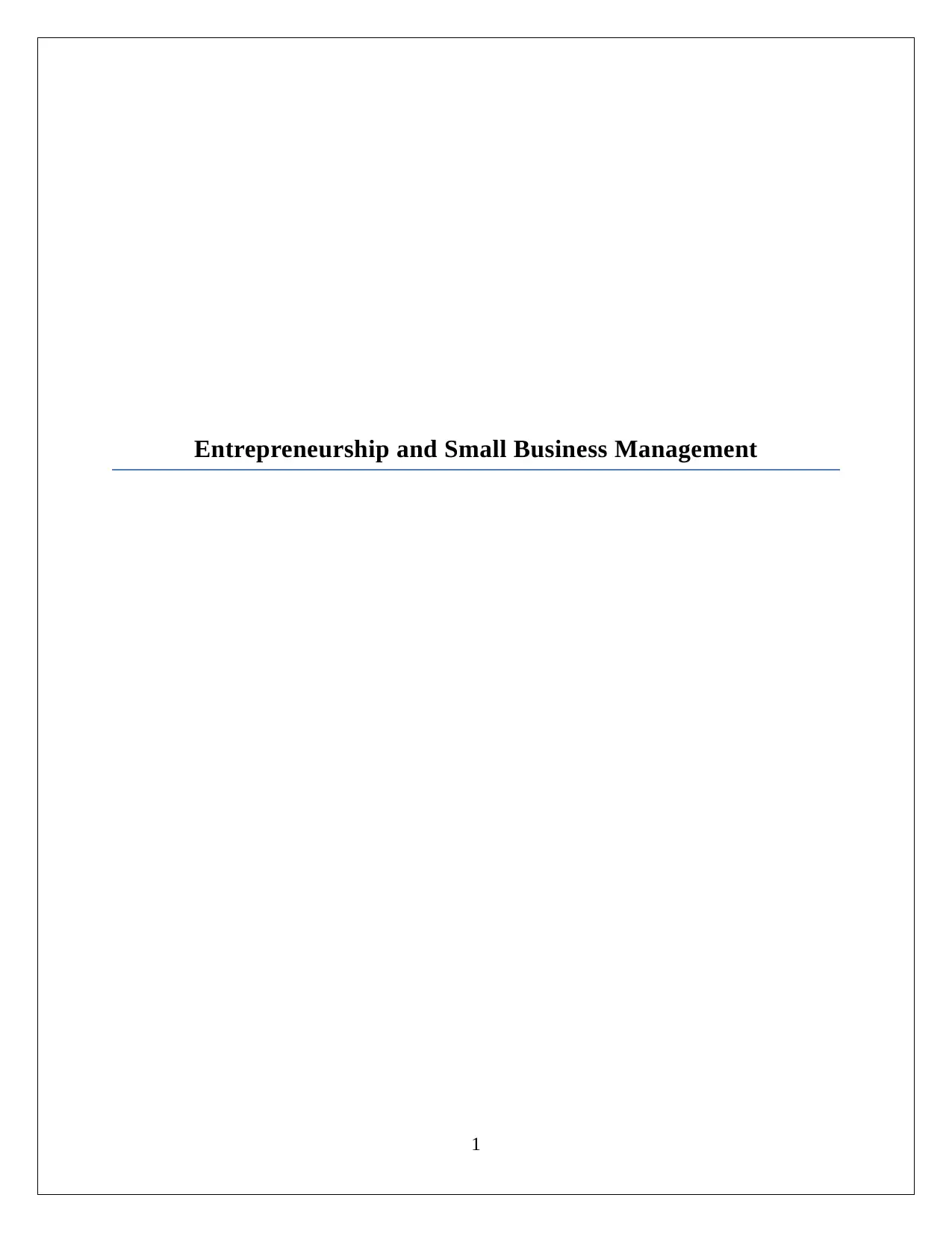
Entrepreneurship and Small Business Management
1
1
Paraphrase This Document
Need a fresh take? Get an instant paraphrase of this document with our AI Paraphraser
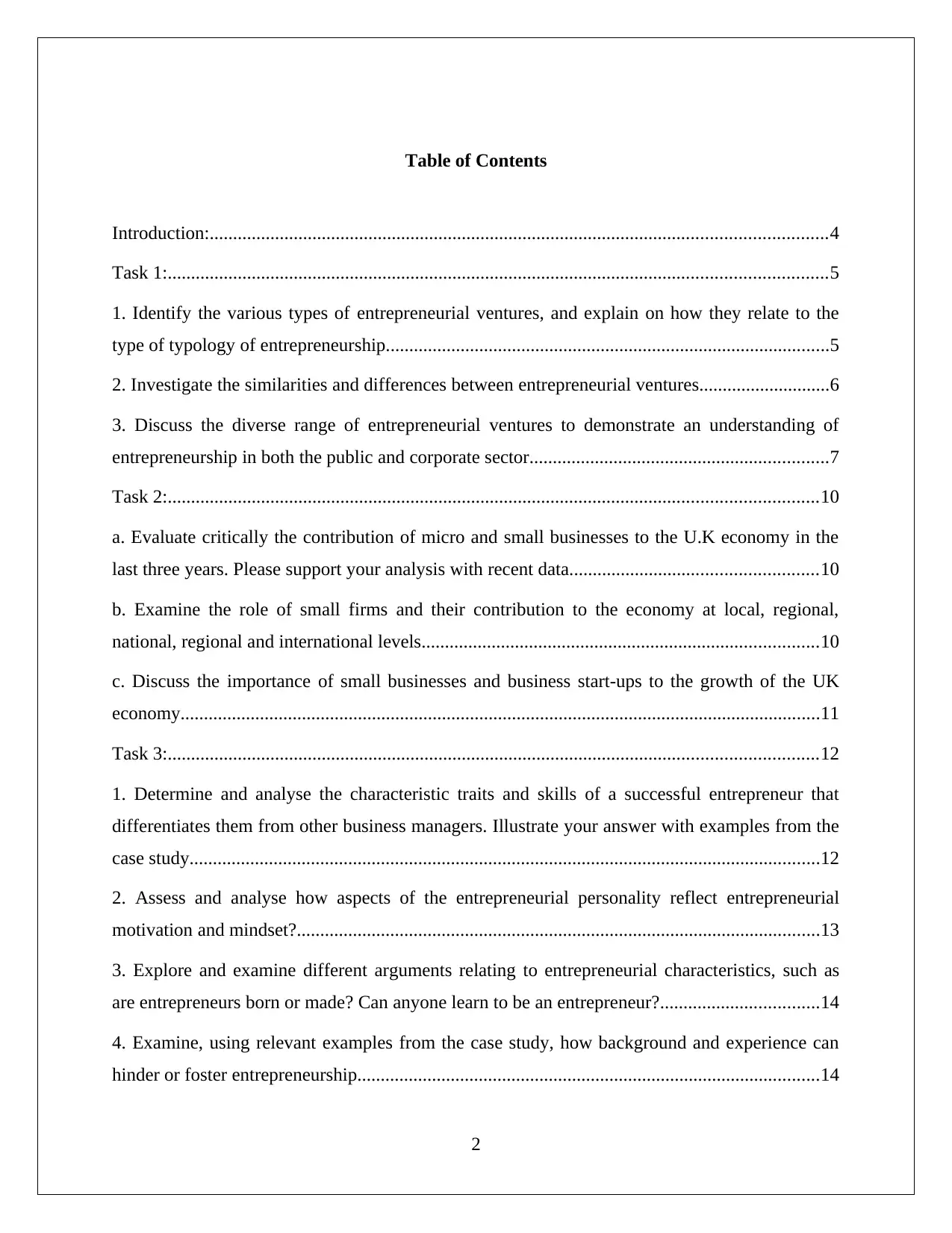
Table of Contents
Introduction:....................................................................................................................................4
Task 1:.............................................................................................................................................5
1. Identify the various types of entrepreneurial ventures, and explain on how they relate to the
type of typology of entrepreneurship...............................................................................................5
2. Investigate the similarities and differences between entrepreneurial ventures............................6
3. Discuss the diverse range of entrepreneurial ventures to demonstrate an understanding of
entrepreneurship in both the public and corporate sector................................................................7
Task 2:...........................................................................................................................................10
a. Evaluate critically the contribution of micro and small businesses to the U.K economy in the
last three years. Please support your analysis with recent data.....................................................10
b. Examine the role of small firms and their contribution to the economy at local, regional,
national, regional and international levels.....................................................................................10
c. Discuss the importance of small businesses and business start-ups to the growth of the UK
economy.........................................................................................................................................11
Task 3:...........................................................................................................................................12
1. Determine and analyse the characteristic traits and skills of a successful entrepreneur that
differentiates them from other business managers. Illustrate your answer with examples from the
case study.......................................................................................................................................12
2. Assess and analyse how aspects of the entrepreneurial personality reflect entrepreneurial
motivation and mindset?................................................................................................................13
3. Explore and examine different arguments relating to entrepreneurial characteristics, such as
are entrepreneurs born or made? Can anyone learn to be an entrepreneur?..................................14
4. Examine, using relevant examples from the case study, how background and experience can
hinder or foster entrepreneurship...................................................................................................14
2
Introduction:....................................................................................................................................4
Task 1:.............................................................................................................................................5
1. Identify the various types of entrepreneurial ventures, and explain on how they relate to the
type of typology of entrepreneurship...............................................................................................5
2. Investigate the similarities and differences between entrepreneurial ventures............................6
3. Discuss the diverse range of entrepreneurial ventures to demonstrate an understanding of
entrepreneurship in both the public and corporate sector................................................................7
Task 2:...........................................................................................................................................10
a. Evaluate critically the contribution of micro and small businesses to the U.K economy in the
last three years. Please support your analysis with recent data.....................................................10
b. Examine the role of small firms and their contribution to the economy at local, regional,
national, regional and international levels.....................................................................................10
c. Discuss the importance of small businesses and business start-ups to the growth of the UK
economy.........................................................................................................................................11
Task 3:...........................................................................................................................................12
1. Determine and analyse the characteristic traits and skills of a successful entrepreneur that
differentiates them from other business managers. Illustrate your answer with examples from the
case study.......................................................................................................................................12
2. Assess and analyse how aspects of the entrepreneurial personality reflect entrepreneurial
motivation and mindset?................................................................................................................13
3. Explore and examine different arguments relating to entrepreneurial characteristics, such as
are entrepreneurs born or made? Can anyone learn to be an entrepreneur?..................................14
4. Examine, using relevant examples from the case study, how background and experience can
hinder or foster entrepreneurship...................................................................................................14
2

5. Analyse the link between entrepreneurial characteristics and the influence of personal
background and experience to specific successful entrepreneurs. Critically evaluate how the
background and experience influences entrepreneurs, both positively and negatively. Illustrate
your answer by comparing and contrasting examples that you have researched independently
from the case study........................................................................................................................15
Conclusion:....................................................................................................................................17
Reference list:................................................................................................................................18
3
background and experience to specific successful entrepreneurs. Critically evaluate how the
background and experience influences entrepreneurs, both positively and negatively. Illustrate
your answer by comparing and contrasting examples that you have researched independently
from the case study........................................................................................................................15
Conclusion:....................................................................................................................................17
Reference list:................................................................................................................................18
3
⊘ This is a preview!⊘
Do you want full access?
Subscribe today to unlock all pages.

Trusted by 1+ million students worldwide
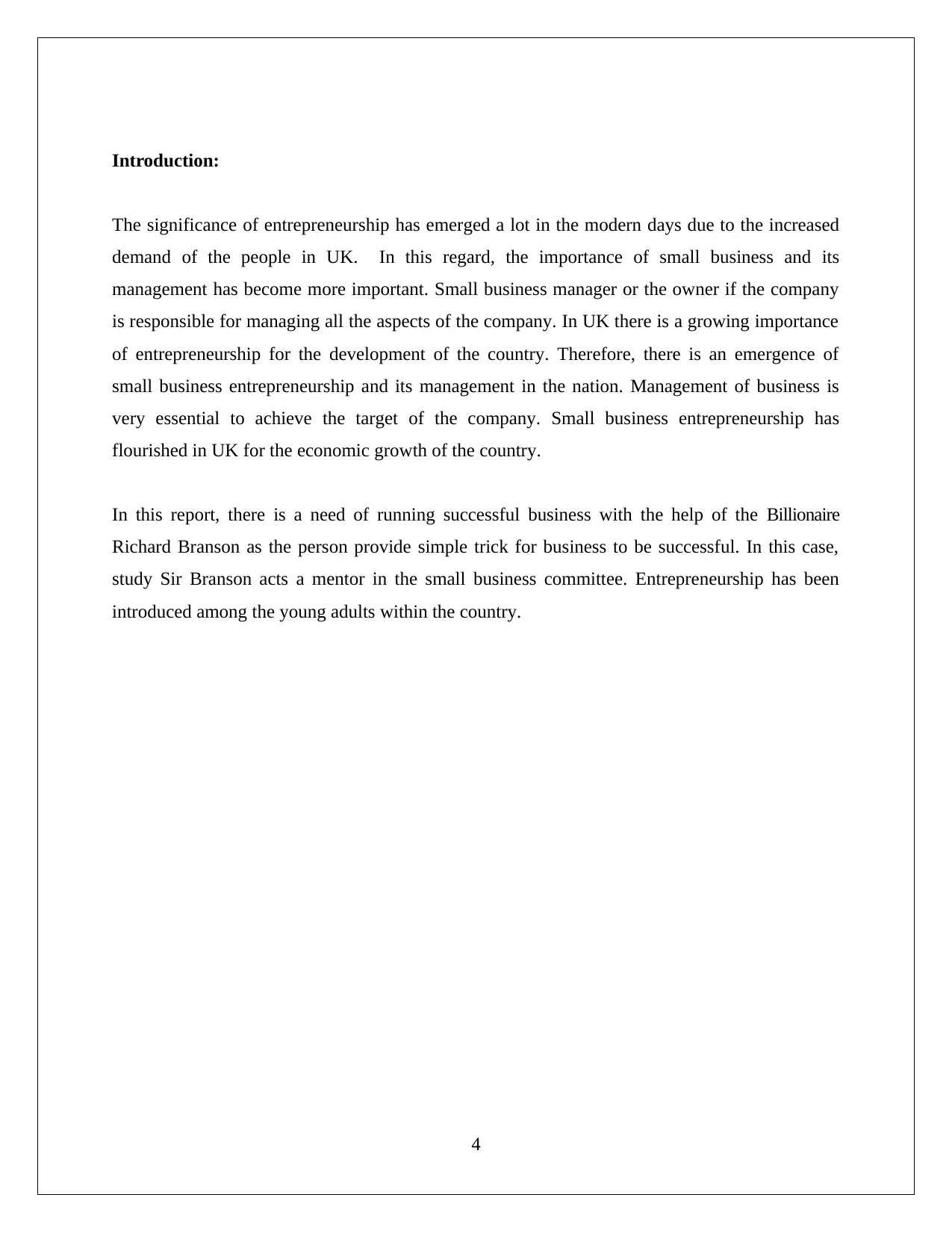
Introduction:
The significance of entrepreneurship has emerged a lot in the modern days due to the increased
demand of the people in UK. In this regard, the importance of small business and its
management has become more important. Small business manager or the owner if the company
is responsible for managing all the aspects of the company. In UK there is a growing importance
of entrepreneurship for the development of the country. Therefore, there is an emergence of
small business entrepreneurship and its management in the nation. Management of business is
very essential to achieve the target of the company. Small business entrepreneurship has
flourished in UK for the economic growth of the country.
In this report, there is a need of running successful business with the help of the Billionaire
Richard Branson as the person provide simple trick for business to be successful. In this case,
study Sir Branson acts a mentor in the small business committee. Entrepreneurship has been
introduced among the young adults within the country.
4
The significance of entrepreneurship has emerged a lot in the modern days due to the increased
demand of the people in UK. In this regard, the importance of small business and its
management has become more important. Small business manager or the owner if the company
is responsible for managing all the aspects of the company. In UK there is a growing importance
of entrepreneurship for the development of the country. Therefore, there is an emergence of
small business entrepreneurship and its management in the nation. Management of business is
very essential to achieve the target of the company. Small business entrepreneurship has
flourished in UK for the economic growth of the country.
In this report, there is a need of running successful business with the help of the Billionaire
Richard Branson as the person provide simple trick for business to be successful. In this case,
study Sir Branson acts a mentor in the small business committee. Entrepreneurship has been
introduced among the young adults within the country.
4
Paraphrase This Document
Need a fresh take? Get an instant paraphrase of this document with our AI Paraphraser
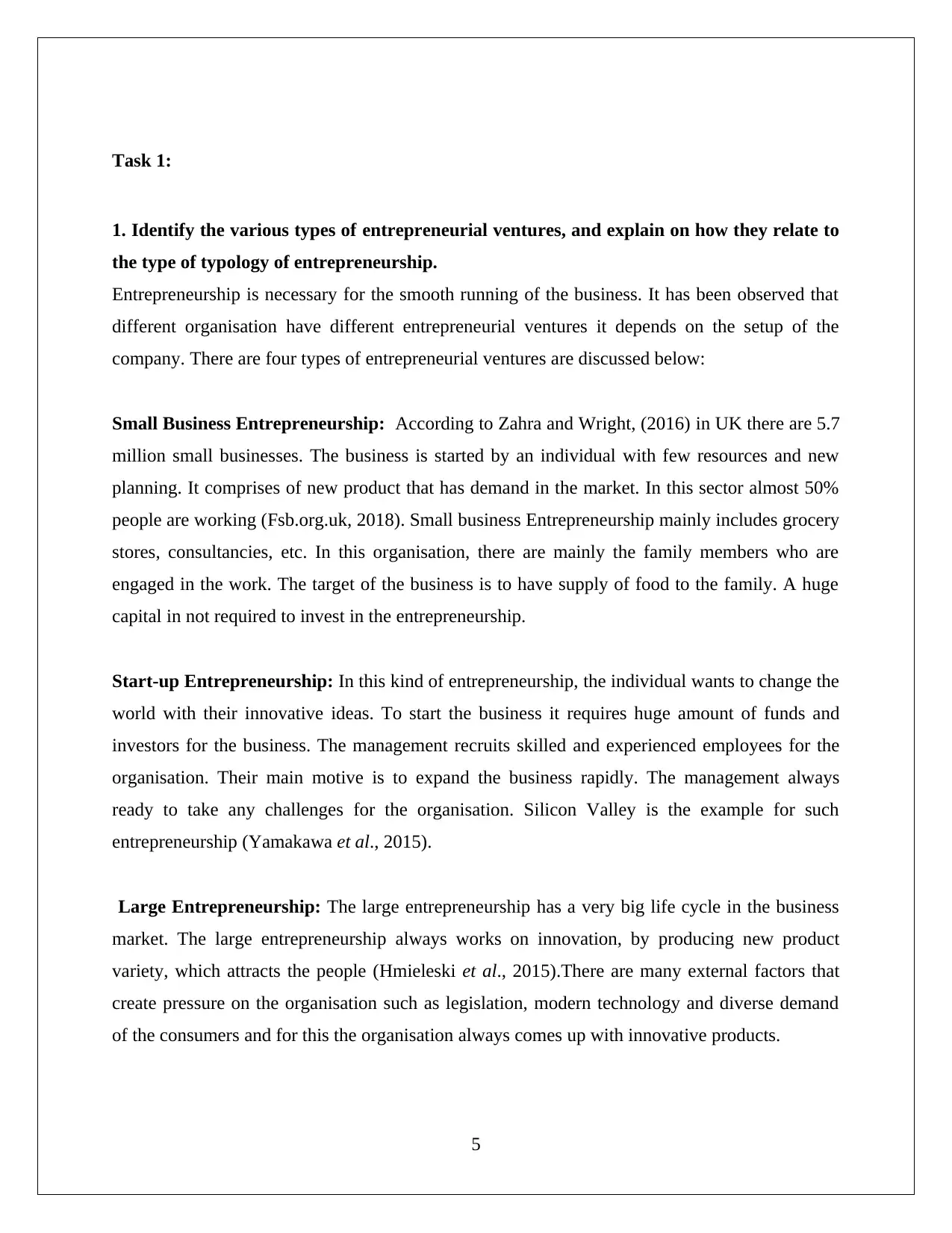
Task 1:
1. Identify the various types of entrepreneurial ventures, and explain on how they relate to
the type of typology of entrepreneurship.
Entrepreneurship is necessary for the smooth running of the business. It has been observed that
different organisation have different entrepreneurial ventures it depends on the setup of the
company. There are four types of entrepreneurial ventures are discussed below:
Small Business Entrepreneurship: According to Zahra and Wright, (2016) in UK there are 5.7
million small businesses. The business is started by an individual with few resources and new
planning. It comprises of new product that has demand in the market. In this sector almost 50%
people are working (Fsb.org.uk, 2018). Small business Entrepreneurship mainly includes grocery
stores, consultancies, etc. In this organisation, there are mainly the family members who are
engaged in the work. The target of the business is to have supply of food to the family. A huge
capital in not required to invest in the entrepreneurship.
Start-up Entrepreneurship: In this kind of entrepreneurship, the individual wants to change the
world with their innovative ideas. To start the business it requires huge amount of funds and
investors for the business. The management recruits skilled and experienced employees for the
organisation. Their main motive is to expand the business rapidly. The management always
ready to take any challenges for the organisation. Silicon Valley is the example for such
entrepreneurship (Yamakawa et al., 2015).
Large Entrepreneurship: The large entrepreneurship has a very big life cycle in the business
market. The large entrepreneurship always works on innovation, by producing new product
variety, which attracts the people (Hmieleski et al., 2015).There are many external factors that
create pressure on the organisation such as legislation, modern technology and diverse demand
of the consumers and for this the organisation always comes up with innovative products.
5
1. Identify the various types of entrepreneurial ventures, and explain on how they relate to
the type of typology of entrepreneurship.
Entrepreneurship is necessary for the smooth running of the business. It has been observed that
different organisation have different entrepreneurial ventures it depends on the setup of the
company. There are four types of entrepreneurial ventures are discussed below:
Small Business Entrepreneurship: According to Zahra and Wright, (2016) in UK there are 5.7
million small businesses. The business is started by an individual with few resources and new
planning. It comprises of new product that has demand in the market. In this sector almost 50%
people are working (Fsb.org.uk, 2018). Small business Entrepreneurship mainly includes grocery
stores, consultancies, etc. In this organisation, there are mainly the family members who are
engaged in the work. The target of the business is to have supply of food to the family. A huge
capital in not required to invest in the entrepreneurship.
Start-up Entrepreneurship: In this kind of entrepreneurship, the individual wants to change the
world with their innovative ideas. To start the business it requires huge amount of funds and
investors for the business. The management recruits skilled and experienced employees for the
organisation. Their main motive is to expand the business rapidly. The management always
ready to take any challenges for the organisation. Silicon Valley is the example for such
entrepreneurship (Yamakawa et al., 2015).
Large Entrepreneurship: The large entrepreneurship has a very big life cycle in the business
market. The large entrepreneurship always works on innovation, by producing new product
variety, which attracts the people (Hmieleski et al., 2015).There are many external factors that
create pressure on the organisation such as legislation, modern technology and diverse demand
of the consumers and for this the organisation always comes up with innovative products.
5
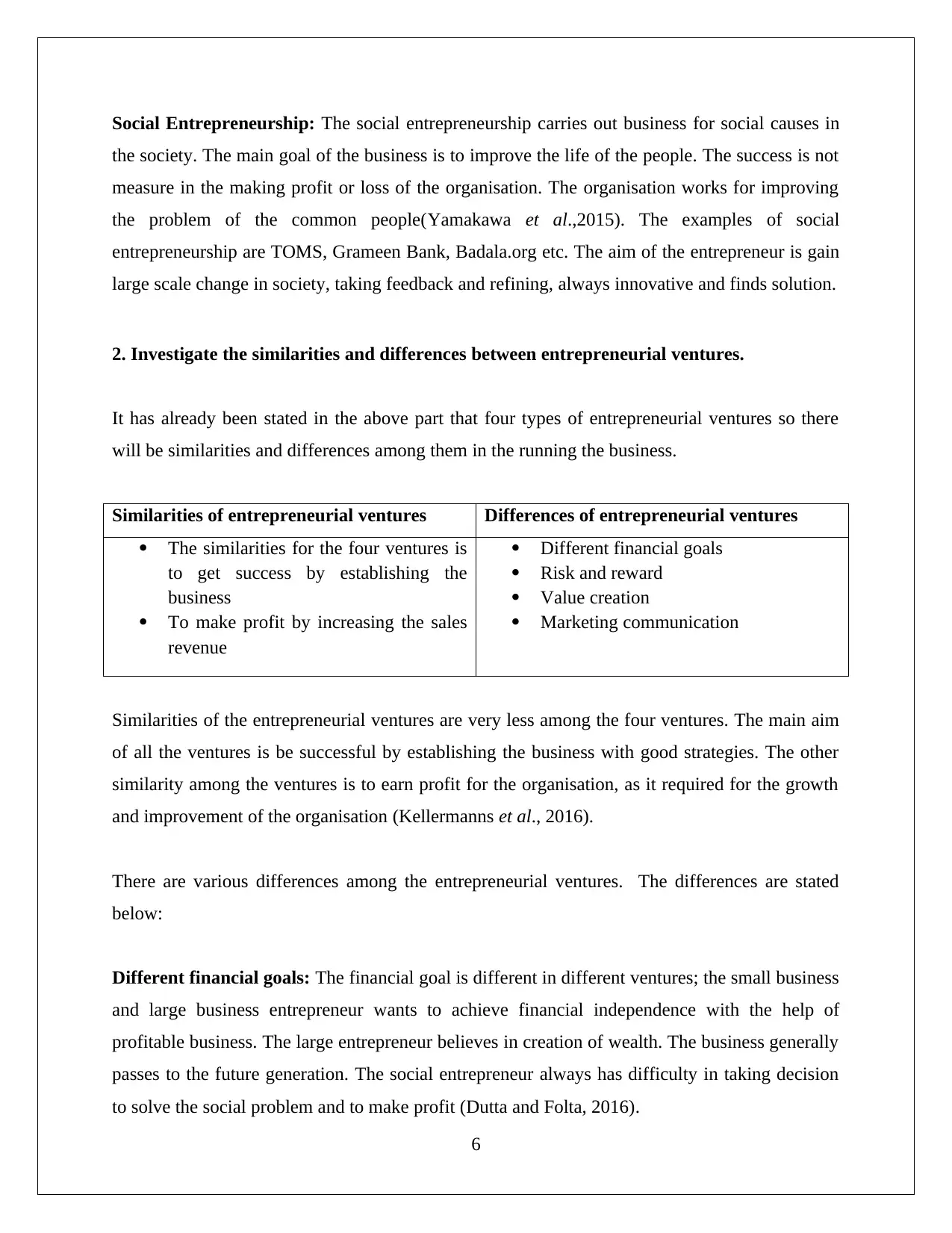
Social Entrepreneurship: The social entrepreneurship carries out business for social causes in
the society. The main goal of the business is to improve the life of the people. The success is not
measure in the making profit or loss of the organisation. The organisation works for improving
the problem of the common people(Yamakawa et al.,2015). The examples of social
entrepreneurship are TOMS, Grameen Bank, Badala.org etc. The aim of the entrepreneur is gain
large scale change in society, taking feedback and refining, always innovative and finds solution.
2. Investigate the similarities and differences between entrepreneurial ventures.
It has already been stated in the above part that four types of entrepreneurial ventures so there
will be similarities and differences among them in the running the business.
Similarities of entrepreneurial ventures Differences of entrepreneurial ventures
The similarities for the four ventures is
to get success by establishing the
business
To make profit by increasing the sales
revenue
Different financial goals
Risk and reward
Value creation
Marketing communication
Similarities of the entrepreneurial ventures are very less among the four ventures. The main aim
of all the ventures is be successful by establishing the business with good strategies. The other
similarity among the ventures is to earn profit for the organisation, as it required for the growth
and improvement of the organisation (Kellermanns et al., 2016).
There are various differences among the entrepreneurial ventures. The differences are stated
below:
Different financial goals: The financial goal is different in different ventures; the small business
and large business entrepreneur wants to achieve financial independence with the help of
profitable business. The large entrepreneur believes in creation of wealth. The business generally
passes to the future generation. The social entrepreneur always has difficulty in taking decision
to solve the social problem and to make profit (Dutta and Folta, 2016).
6
the society. The main goal of the business is to improve the life of the people. The success is not
measure in the making profit or loss of the organisation. The organisation works for improving
the problem of the common people(Yamakawa et al.,2015). The examples of social
entrepreneurship are TOMS, Grameen Bank, Badala.org etc. The aim of the entrepreneur is gain
large scale change in society, taking feedback and refining, always innovative and finds solution.
2. Investigate the similarities and differences between entrepreneurial ventures.
It has already been stated in the above part that four types of entrepreneurial ventures so there
will be similarities and differences among them in the running the business.
Similarities of entrepreneurial ventures Differences of entrepreneurial ventures
The similarities for the four ventures is
to get success by establishing the
business
To make profit by increasing the sales
revenue
Different financial goals
Risk and reward
Value creation
Marketing communication
Similarities of the entrepreneurial ventures are very less among the four ventures. The main aim
of all the ventures is be successful by establishing the business with good strategies. The other
similarity among the ventures is to earn profit for the organisation, as it required for the growth
and improvement of the organisation (Kellermanns et al., 2016).
There are various differences among the entrepreneurial ventures. The differences are stated
below:
Different financial goals: The financial goal is different in different ventures; the small business
and large business entrepreneur wants to achieve financial independence with the help of
profitable business. The large entrepreneur believes in creation of wealth. The business generally
passes to the future generation. The social entrepreneur always has difficulty in taking decision
to solve the social problem and to make profit (Dutta and Folta, 2016).
6
⊘ This is a preview!⊘
Do you want full access?
Subscribe today to unlock all pages.

Trusted by 1+ million students worldwide
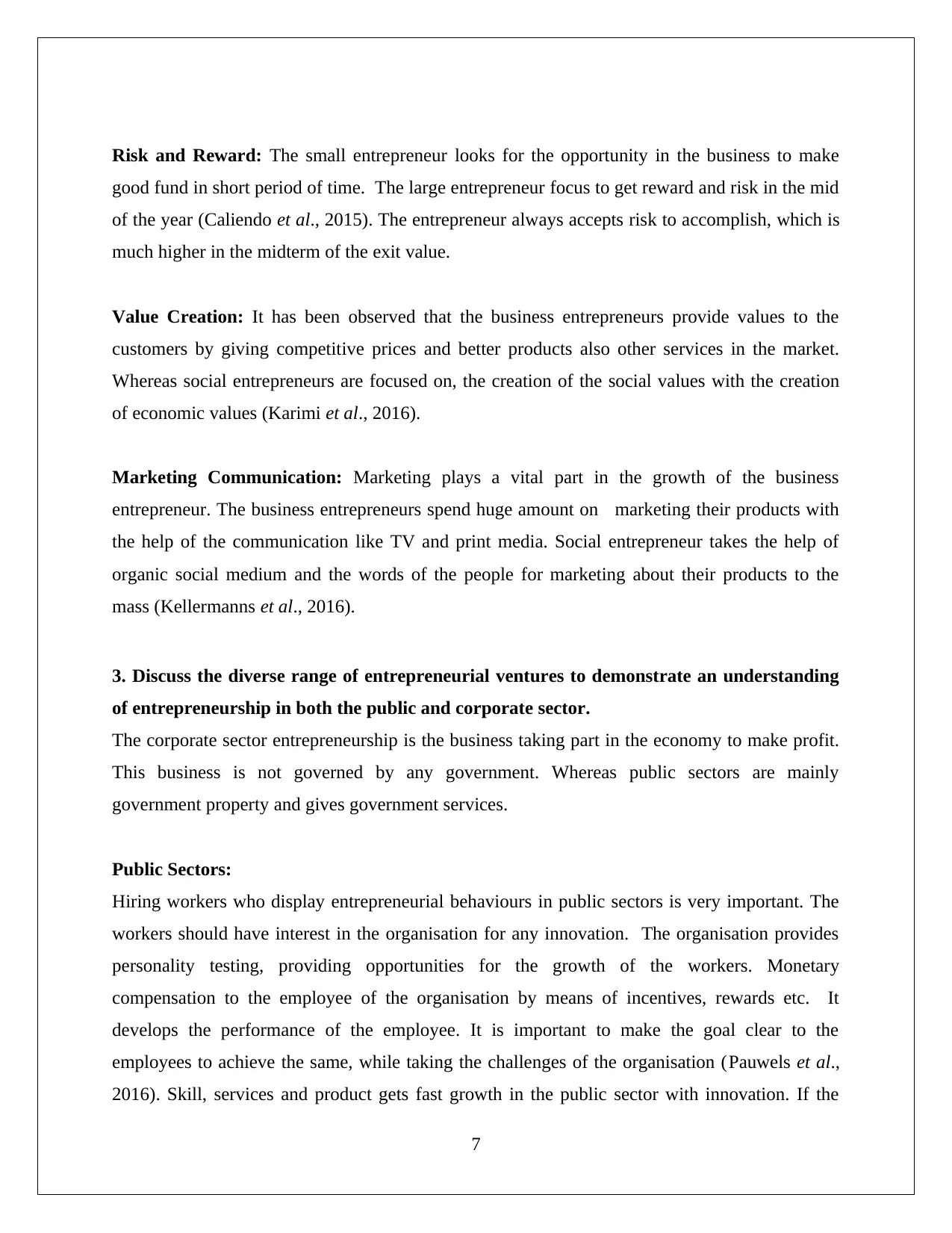
Risk and Reward: The small entrepreneur looks for the opportunity in the business to make
good fund in short period of time. The large entrepreneur focus to get reward and risk in the mid
of the year (Caliendo et al., 2015). The entrepreneur always accepts risk to accomplish, which is
much higher in the midterm of the exit value.
Value Creation: It has been observed that the business entrepreneurs provide values to the
customers by giving competitive prices and better products also other services in the market.
Whereas social entrepreneurs are focused on, the creation of the social values with the creation
of economic values (Karimi et al., 2016).
Marketing Communication: Marketing plays a vital part in the growth of the business
entrepreneur. The business entrepreneurs spend huge amount on marketing their products with
the help of the communication like TV and print media. Social entrepreneur takes the help of
organic social medium and the words of the people for marketing about their products to the
mass (Kellermanns et al., 2016).
3. Discuss the diverse range of entrepreneurial ventures to demonstrate an understanding
of entrepreneurship in both the public and corporate sector.
The corporate sector entrepreneurship is the business taking part in the economy to make profit.
This business is not governed by any government. Whereas public sectors are mainly
government property and gives government services.
Public Sectors:
Hiring workers who display entrepreneurial behaviours in public sectors is very important. The
workers should have interest in the organisation for any innovation. The organisation provides
personality testing, providing opportunities for the growth of the workers. Monetary
compensation to the employee of the organisation by means of incentives, rewards etc. It
develops the performance of the employee. It is important to make the goal clear to the
employees to achieve the same, while taking the challenges of the organisation (Pauwels et al.,
2016). Skill, services and product gets fast growth in the public sector with innovation. If the
7
good fund in short period of time. The large entrepreneur focus to get reward and risk in the mid
of the year (Caliendo et al., 2015). The entrepreneur always accepts risk to accomplish, which is
much higher in the midterm of the exit value.
Value Creation: It has been observed that the business entrepreneurs provide values to the
customers by giving competitive prices and better products also other services in the market.
Whereas social entrepreneurs are focused on, the creation of the social values with the creation
of economic values (Karimi et al., 2016).
Marketing Communication: Marketing plays a vital part in the growth of the business
entrepreneur. The business entrepreneurs spend huge amount on marketing their products with
the help of the communication like TV and print media. Social entrepreneur takes the help of
organic social medium and the words of the people for marketing about their products to the
mass (Kellermanns et al., 2016).
3. Discuss the diverse range of entrepreneurial ventures to demonstrate an understanding
of entrepreneurship in both the public and corporate sector.
The corporate sector entrepreneurship is the business taking part in the economy to make profit.
This business is not governed by any government. Whereas public sectors are mainly
government property and gives government services.
Public Sectors:
Hiring workers who display entrepreneurial behaviours in public sectors is very important. The
workers should have interest in the organisation for any innovation. The organisation provides
personality testing, providing opportunities for the growth of the workers. Monetary
compensation to the employee of the organisation by means of incentives, rewards etc. It
develops the performance of the employee. It is important to make the goal clear to the
employees to achieve the same, while taking the challenges of the organisation (Pauwels et al.,
2016). Skill, services and product gets fast growth in the public sector with innovation. If the
7
Paraphrase This Document
Need a fresh take? Get an instant paraphrase of this document with our AI Paraphraser
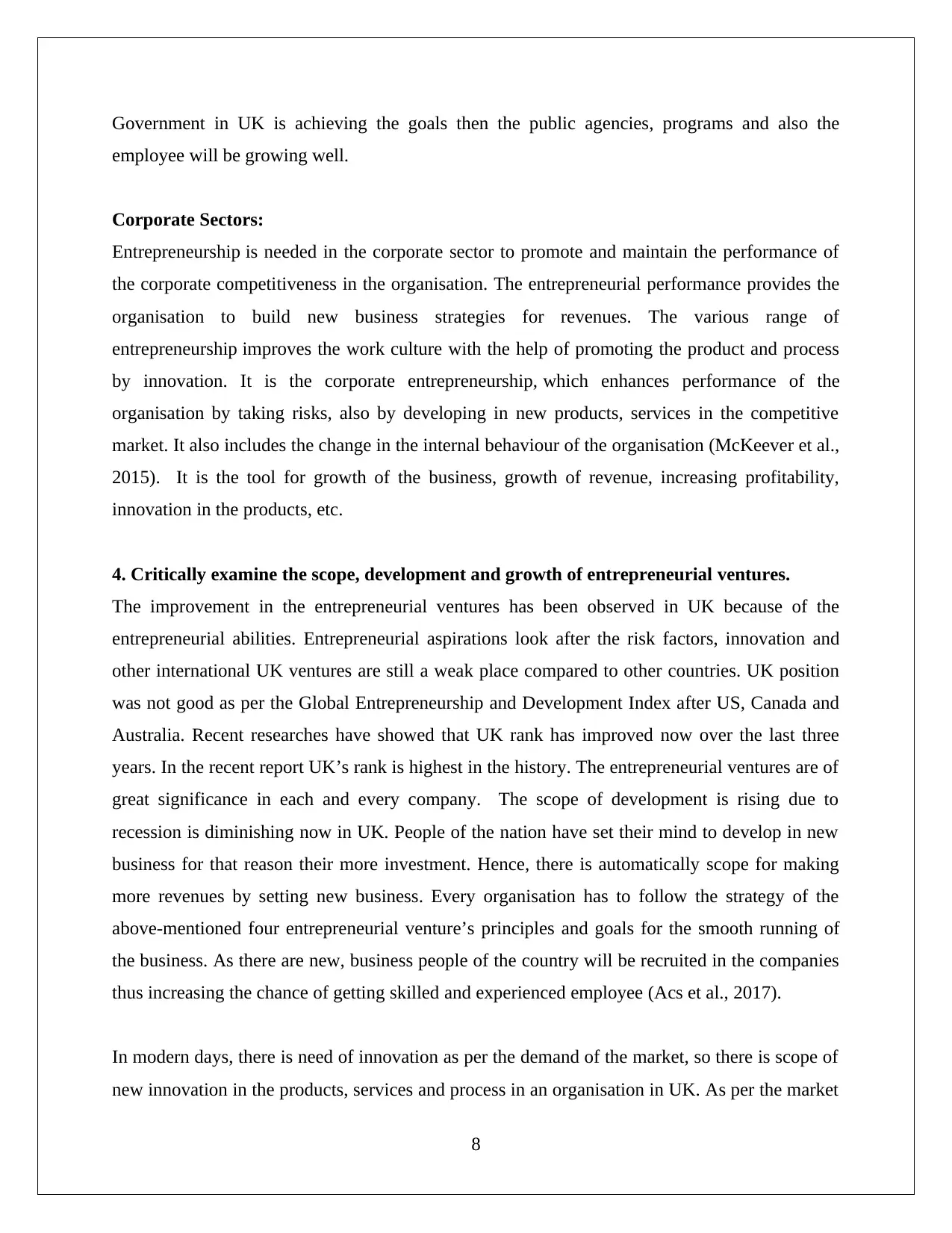
Government in UK is achieving the goals then the public agencies, programs and also the
employee will be growing well.
Corporate Sectors:
Entrepreneurship is needed in the corporate sector to promote and maintain the performance of
the corporate competitiveness in the organisation. The entrepreneurial performance provides the
organisation to build new business strategies for revenues. The various range of
entrepreneurship improves the work culture with the help of promoting the product and process
by innovation. It is the corporate entrepreneurship, which enhances performance of the
organisation by taking risks, also by developing in new products, services in the competitive
market. It also includes the change in the internal behaviour of the organisation (McKeever et al.,
2015). It is the tool for growth of the business, growth of revenue, increasing profitability,
innovation in the products, etc.
4. Critically examine the scope, development and growth of entrepreneurial ventures.
The improvement in the entrepreneurial ventures has been observed in UK because of the
entrepreneurial abilities. Entrepreneurial aspirations look after the risk factors, innovation and
other international UK ventures are still a weak place compared to other countries. UK position
was not good as per the Global Entrepreneurship and Development Index after US, Canada and
Australia. Recent researches have showed that UK rank has improved now over the last three
years. In the recent report UK’s rank is highest in the history. The entrepreneurial ventures are of
great significance in each and every company. The scope of development is rising due to
recession is diminishing now in UK. People of the nation have set their mind to develop in new
business for that reason their more investment. Hence, there is automatically scope for making
more revenues by setting new business. Every organisation has to follow the strategy of the
above-mentioned four entrepreneurial venture’s principles and goals for the smooth running of
the business. As there are new, business people of the country will be recruited in the companies
thus increasing the chance of getting skilled and experienced employee (Acs et al., 2017).
In modern days, there is need of innovation as per the demand of the market, so there is scope of
new innovation in the products, services and process in an organisation in UK. As per the market
8
employee will be growing well.
Corporate Sectors:
Entrepreneurship is needed in the corporate sector to promote and maintain the performance of
the corporate competitiveness in the organisation. The entrepreneurial performance provides the
organisation to build new business strategies for revenues. The various range of
entrepreneurship improves the work culture with the help of promoting the product and process
by innovation. It is the corporate entrepreneurship, which enhances performance of the
organisation by taking risks, also by developing in new products, services in the competitive
market. It also includes the change in the internal behaviour of the organisation (McKeever et al.,
2015). It is the tool for growth of the business, growth of revenue, increasing profitability,
innovation in the products, etc.
4. Critically examine the scope, development and growth of entrepreneurial ventures.
The improvement in the entrepreneurial ventures has been observed in UK because of the
entrepreneurial abilities. Entrepreneurial aspirations look after the risk factors, innovation and
other international UK ventures are still a weak place compared to other countries. UK position
was not good as per the Global Entrepreneurship and Development Index after US, Canada and
Australia. Recent researches have showed that UK rank has improved now over the last three
years. In the recent report UK’s rank is highest in the history. The entrepreneurial ventures are of
great significance in each and every company. The scope of development is rising due to
recession is diminishing now in UK. People of the nation have set their mind to develop in new
business for that reason their more investment. Hence, there is automatically scope for making
more revenues by setting new business. Every organisation has to follow the strategy of the
above-mentioned four entrepreneurial venture’s principles and goals for the smooth running of
the business. As there are new, business people of the country will be recruited in the companies
thus increasing the chance of getting skilled and experienced employee (Acs et al., 2017).
In modern days, there is need of innovation as per the demand of the market, so there is scope of
new innovation in the products, services and process in an organisation in UK. As per the market
8
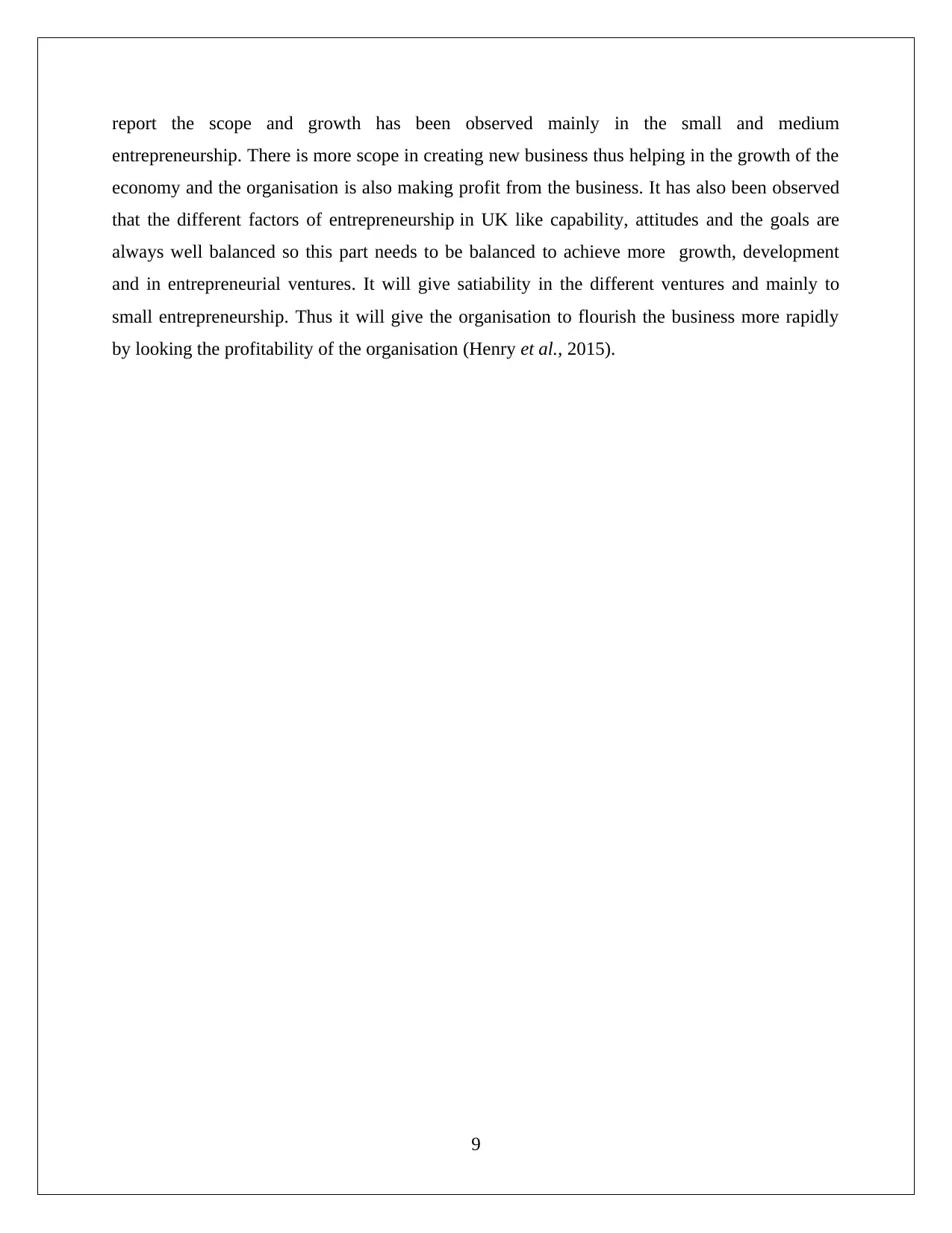
report the scope and growth has been observed mainly in the small and medium
entrepreneurship. There is more scope in creating new business thus helping in the growth of the
economy and the organisation is also making profit from the business. It has also been observed
that the different factors of entrepreneurship in UK like capability, attitudes and the goals are
always well balanced so this part needs to be balanced to achieve more growth, development
and in entrepreneurial ventures. It will give satiability in the different ventures and mainly to
small entrepreneurship. Thus it will give the organisation to flourish the business more rapidly
by looking the profitability of the organisation (Henry et al., 2015).
9
entrepreneurship. There is more scope in creating new business thus helping in the growth of the
economy and the organisation is also making profit from the business. It has also been observed
that the different factors of entrepreneurship in UK like capability, attitudes and the goals are
always well balanced so this part needs to be balanced to achieve more growth, development
and in entrepreneurial ventures. It will give satiability in the different ventures and mainly to
small entrepreneurship. Thus it will give the organisation to flourish the business more rapidly
by looking the profitability of the organisation (Henry et al., 2015).
9
⊘ This is a preview!⊘
Do you want full access?
Subscribe today to unlock all pages.

Trusted by 1+ million students worldwide
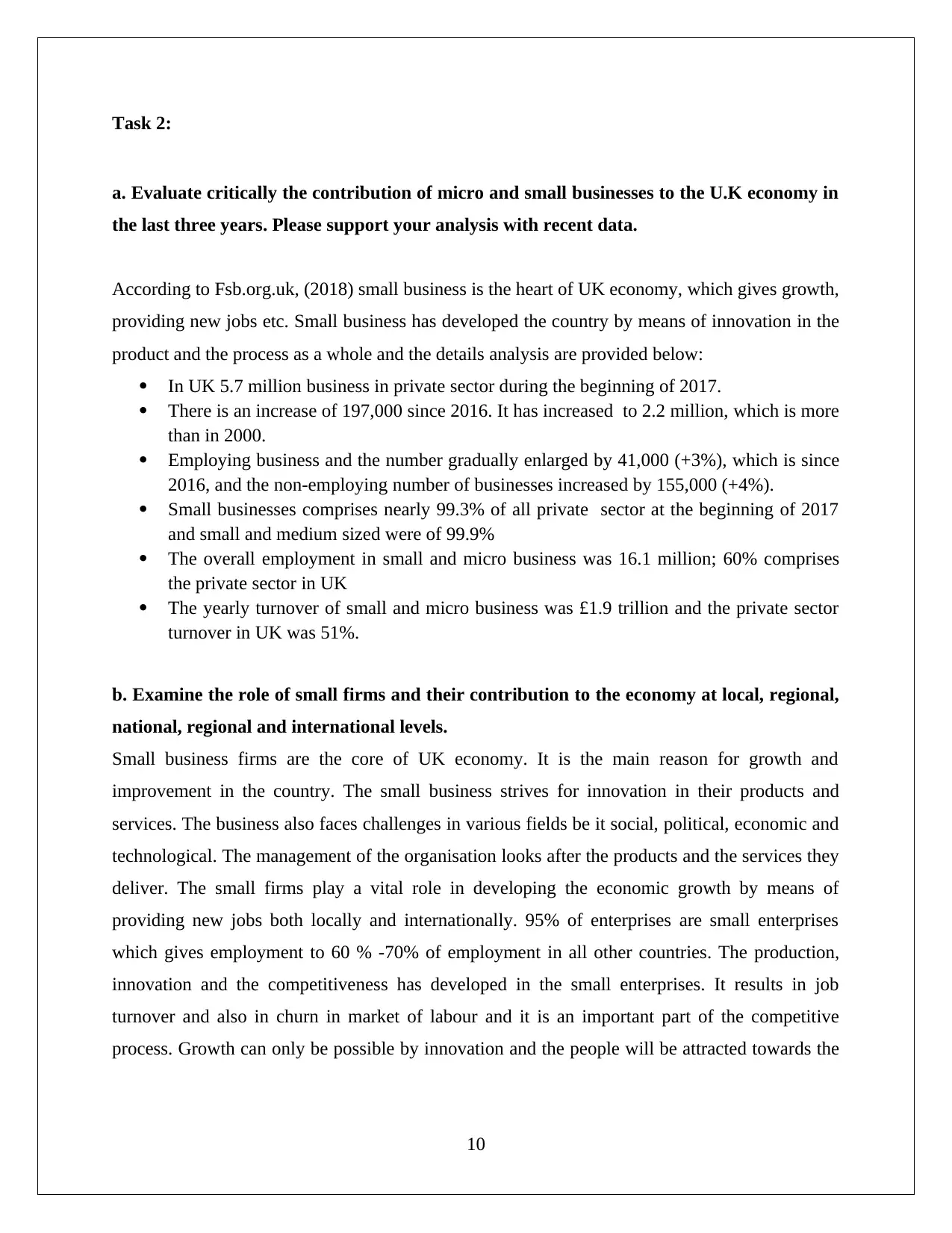
Task 2:
a. Evaluate critically the contribution of micro and small businesses to the U.K economy in
the last three years. Please support your analysis with recent data.
According to Fsb.org.uk, (2018) small business is the heart of UK economy, which gives growth,
providing new jobs etc. Small business has developed the country by means of innovation in the
product and the process as a whole and the details analysis are provided below:
In UK 5.7 million business in private sector during the beginning of 2017.
There is an increase of 197,000 since 2016. It has increased to 2.2 million, which is more
than in 2000.
Employing business and the number gradually enlarged by 41,000 (+3%), which is since
2016, and the non-employing number of businesses increased by 155,000 (+4%).
Small businesses comprises nearly 99.3% of all private sector at the beginning of 2017
and small and medium sized were of 99.9%
The overall employment in small and micro business was 16.1 million; 60% comprises
the private sector in UK
The yearly turnover of small and micro business was £1.9 trillion and the private sector
turnover in UK was 51%.
b. Examine the role of small firms and their contribution to the economy at local, regional,
national, regional and international levels.
Small business firms are the core of UK economy. It is the main reason for growth and
improvement in the country. The small business strives for innovation in their products and
services. The business also faces challenges in various fields be it social, political, economic and
technological. The management of the organisation looks after the products and the services they
deliver. The small firms play a vital role in developing the economic growth by means of
providing new jobs both locally and internationally. 95% of enterprises are small enterprises
which gives employment to 60 % -70% of employment in all other countries. The production,
innovation and the competitiveness has developed in the small enterprises. It results in job
turnover and also in churn in market of labour and it is an important part of the competitive
process. Growth can only be possible by innovation and the people will be attracted towards the
10
a. Evaluate critically the contribution of micro and small businesses to the U.K economy in
the last three years. Please support your analysis with recent data.
According to Fsb.org.uk, (2018) small business is the heart of UK economy, which gives growth,
providing new jobs etc. Small business has developed the country by means of innovation in the
product and the process as a whole and the details analysis are provided below:
In UK 5.7 million business in private sector during the beginning of 2017.
There is an increase of 197,000 since 2016. It has increased to 2.2 million, which is more
than in 2000.
Employing business and the number gradually enlarged by 41,000 (+3%), which is since
2016, and the non-employing number of businesses increased by 155,000 (+4%).
Small businesses comprises nearly 99.3% of all private sector at the beginning of 2017
and small and medium sized were of 99.9%
The overall employment in small and micro business was 16.1 million; 60% comprises
the private sector in UK
The yearly turnover of small and micro business was £1.9 trillion and the private sector
turnover in UK was 51%.
b. Examine the role of small firms and their contribution to the economy at local, regional,
national, regional and international levels.
Small business firms are the core of UK economy. It is the main reason for growth and
improvement in the country. The small business strives for innovation in their products and
services. The business also faces challenges in various fields be it social, political, economic and
technological. The management of the organisation looks after the products and the services they
deliver. The small firms play a vital role in developing the economic growth by means of
providing new jobs both locally and internationally. 95% of enterprises are small enterprises
which gives employment to 60 % -70% of employment in all other countries. The production,
innovation and the competitiveness has developed in the small enterprises. It results in job
turnover and also in churn in market of labour and it is an important part of the competitive
process. Growth can only be possible by innovation and the people will be attracted towards the
10
Paraphrase This Document
Need a fresh take? Get an instant paraphrase of this document with our AI Paraphraser
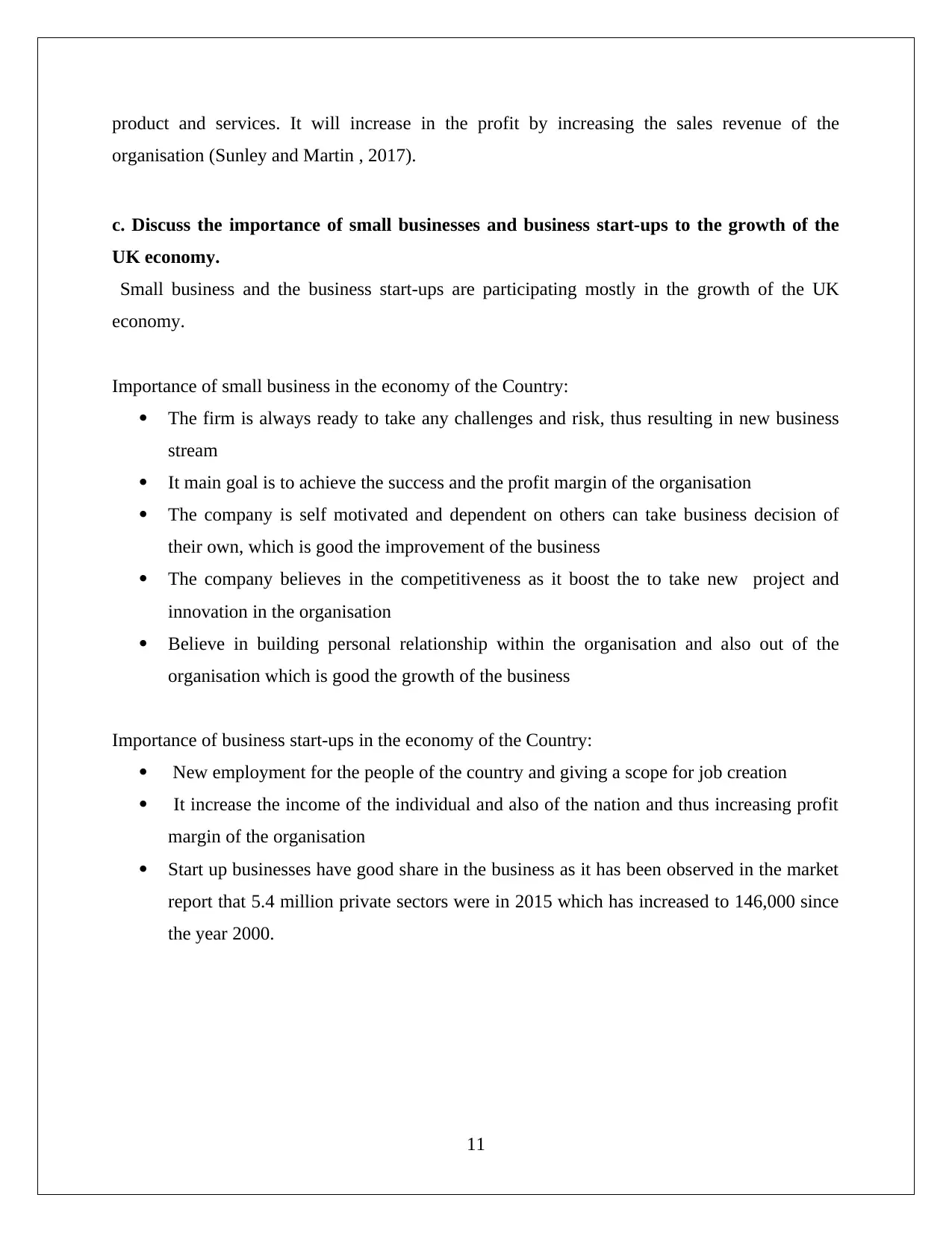
product and services. It will increase in the profit by increasing the sales revenue of the
organisation (Sunley and Martin , 2017).
c. Discuss the importance of small businesses and business start-ups to the growth of the
UK economy.
Small business and the business start-ups are participating mostly in the growth of the UK
economy.
Importance of small business in the economy of the Country:
The firm is always ready to take any challenges and risk, thus resulting in new business
stream
It main goal is to achieve the success and the profit margin of the organisation
The company is self motivated and dependent on others can take business decision of
their own, which is good the improvement of the business
The company believes in the competitiveness as it boost the to take new project and
innovation in the organisation
Believe in building personal relationship within the organisation and also out of the
organisation which is good the growth of the business
Importance of business start-ups in the economy of the Country:
New employment for the people of the country and giving a scope for job creation
It increase the income of the individual and also of the nation and thus increasing profit
margin of the organisation
Start up businesses have good share in the business as it has been observed in the market
report that 5.4 million private sectors were in 2015 which has increased to 146,000 since
the year 2000.
11
organisation (Sunley and Martin , 2017).
c. Discuss the importance of small businesses and business start-ups to the growth of the
UK economy.
Small business and the business start-ups are participating mostly in the growth of the UK
economy.
Importance of small business in the economy of the Country:
The firm is always ready to take any challenges and risk, thus resulting in new business
stream
It main goal is to achieve the success and the profit margin of the organisation
The company is self motivated and dependent on others can take business decision of
their own, which is good the improvement of the business
The company believes in the competitiveness as it boost the to take new project and
innovation in the organisation
Believe in building personal relationship within the organisation and also out of the
organisation which is good the growth of the business
Importance of business start-ups in the economy of the Country:
New employment for the people of the country and giving a scope for job creation
It increase the income of the individual and also of the nation and thus increasing profit
margin of the organisation
Start up businesses have good share in the business as it has been observed in the market
report that 5.4 million private sectors were in 2015 which has increased to 146,000 since
the year 2000.
11
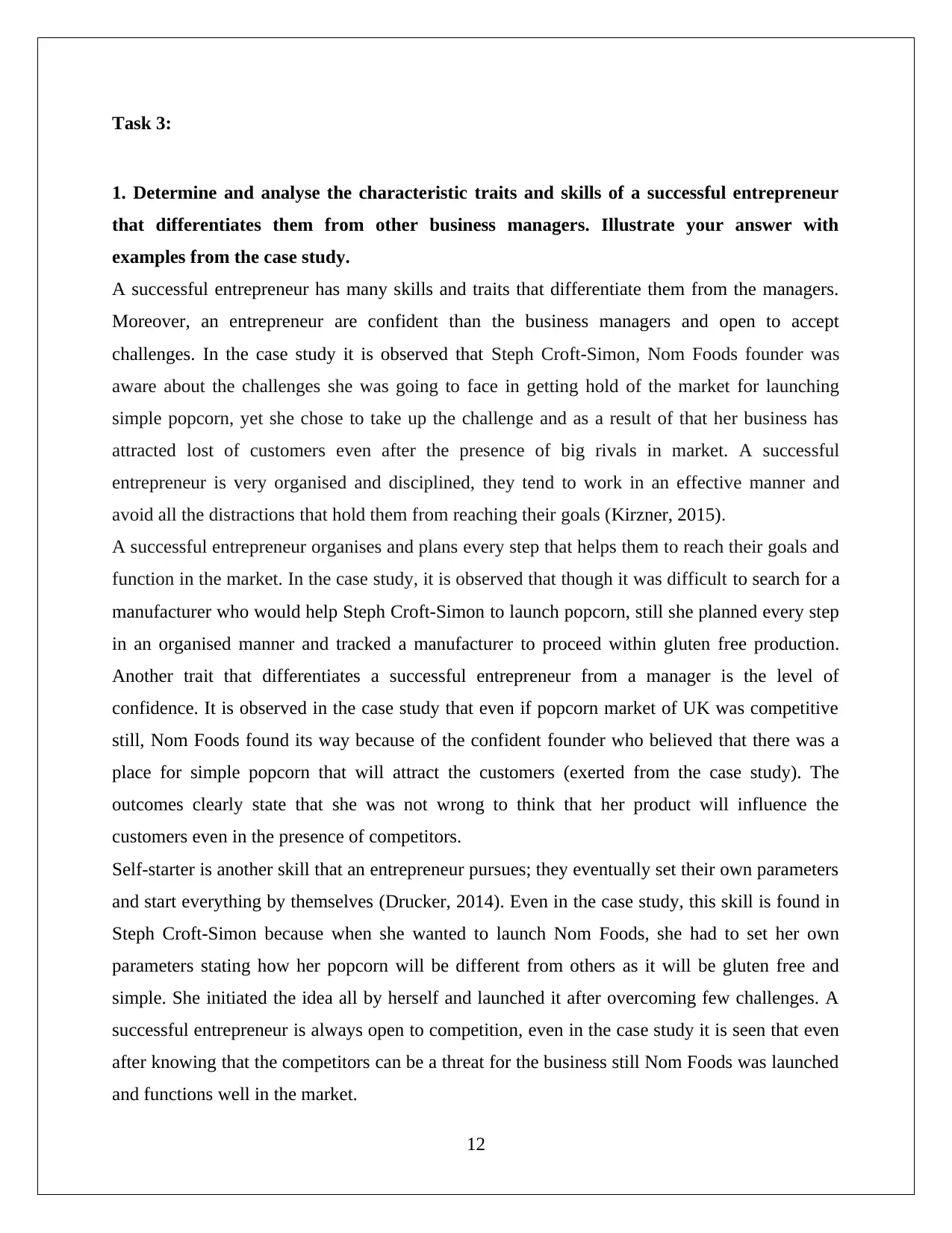
Task 3:
1. Determine and analyse the characteristic traits and skills of a successful entrepreneur
that differentiates them from other business managers. Illustrate your answer with
examples from the case study.
A successful entrepreneur has many skills and traits that differentiate them from the managers.
Moreover, an entrepreneur are confident than the business managers and open to accept
challenges. In the case study it is observed that Steph Croft-Simon, Nom Foods founder was
aware about the challenges she was going to face in getting hold of the market for launching
simple popcorn, yet she chose to take up the challenge and as a result of that her business has
attracted lost of customers even after the presence of big rivals in market. A successful
entrepreneur is very organised and disciplined, they tend to work in an effective manner and
avoid all the distractions that hold them from reaching their goals (Kirzner, 2015).
A successful entrepreneur organises and plans every step that helps them to reach their goals and
function in the market. In the case study, it is observed that though it was difficult to search for a
manufacturer who would help Steph Croft-Simon to launch popcorn, still she planned every step
in an organised manner and tracked a manufacturer to proceed within gluten free production.
Another trait that differentiates a successful entrepreneur from a manager is the level of
confidence. It is observed in the case study that even if popcorn market of UK was competitive
still, Nom Foods found its way because of the confident founder who believed that there was a
place for simple popcorn that will attract the customers (exerted from the case study). The
outcomes clearly state that she was not wrong to think that her product will influence the
customers even in the presence of competitors.
Self-starter is another skill that an entrepreneur pursues; they eventually set their own parameters
and start everything by themselves (Drucker, 2014). Even in the case study, this skill is found in
Steph Croft-Simon because when she wanted to launch Nom Foods, she had to set her own
parameters stating how her popcorn will be different from others as it will be gluten free and
simple. She initiated the idea all by herself and launched it after overcoming few challenges. A
successful entrepreneur is always open to competition, even in the case study it is seen that even
after knowing that the competitors can be a threat for the business still Nom Foods was launched
and functions well in the market.
12
1. Determine and analyse the characteristic traits and skills of a successful entrepreneur
that differentiates them from other business managers. Illustrate your answer with
examples from the case study.
A successful entrepreneur has many skills and traits that differentiate them from the managers.
Moreover, an entrepreneur are confident than the business managers and open to accept
challenges. In the case study it is observed that Steph Croft-Simon, Nom Foods founder was
aware about the challenges she was going to face in getting hold of the market for launching
simple popcorn, yet she chose to take up the challenge and as a result of that her business has
attracted lost of customers even after the presence of big rivals in market. A successful
entrepreneur is very organised and disciplined, they tend to work in an effective manner and
avoid all the distractions that hold them from reaching their goals (Kirzner, 2015).
A successful entrepreneur organises and plans every step that helps them to reach their goals and
function in the market. In the case study, it is observed that though it was difficult to search for a
manufacturer who would help Steph Croft-Simon to launch popcorn, still she planned every step
in an organised manner and tracked a manufacturer to proceed within gluten free production.
Another trait that differentiates a successful entrepreneur from a manager is the level of
confidence. It is observed in the case study that even if popcorn market of UK was competitive
still, Nom Foods found its way because of the confident founder who believed that there was a
place for simple popcorn that will attract the customers (exerted from the case study). The
outcomes clearly state that she was not wrong to think that her product will influence the
customers even in the presence of competitors.
Self-starter is another skill that an entrepreneur pursues; they eventually set their own parameters
and start everything by themselves (Drucker, 2014). Even in the case study, this skill is found in
Steph Croft-Simon because when she wanted to launch Nom Foods, she had to set her own
parameters stating how her popcorn will be different from others as it will be gluten free and
simple. She initiated the idea all by herself and launched it after overcoming few challenges. A
successful entrepreneur is always open to competition, even in the case study it is seen that even
after knowing that the competitors can be a threat for the business still Nom Foods was launched
and functions well in the market.
12
⊘ This is a preview!⊘
Do you want full access?
Subscribe today to unlock all pages.

Trusted by 1+ million students worldwide
1 out of 19
Related Documents
Your All-in-One AI-Powered Toolkit for Academic Success.
+13062052269
info@desklib.com
Available 24*7 on WhatsApp / Email
![[object Object]](/_next/static/media/star-bottom.7253800d.svg)
Unlock your academic potential
Copyright © 2020–2025 A2Z Services. All Rights Reserved. Developed and managed by ZUCOL.


